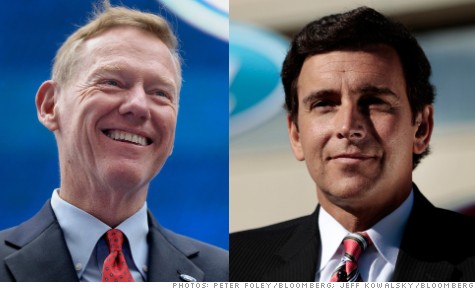
Ford CEO Alan Mulally (left) and heir apparent Mark Fields
(Fortune) -- In the not-so-distant past, management transitions at Ford Motor Co. were much like the firing squad at a South American banana republic.
Henry Ford II abruptly fired president Lee Iacocca in 1978 by calling him into his office and telling him "I simply don't like you." CEO Don Petersen departed in 1989 after losing the confidence of the board of directors with the bizarre announcement that he planned to "repot" himself. And chairman Bill Ford booted CEO Jac Nasser in October 2001 after months of public disputes.
Of course, all of that was an improvement over 1945 when Henry Ford II had to practically disarm the thuggish, gin-toting Harry Bennett in order to take over the company from his ailing grandfather.
If there were any doubts about the changes in Ford (F, Fortune 500) culture wrought by CEO Alan Mulally, they were erased by the news of the latest series of management changes.
Instead of being a textbook example of jarring executive moves, Ford now becomes a business school case study of strategic long-term management transitions.
The transformation is largely the result of Mulally's ability to inspire personal loyalty, due to his transparent and open management style, along with the unqualified support he gets from executive chairman Bill Ford.
MORE: Ford's amazing little engine
In a conference call Thursday, Bill Ford blurted out, "I love Alan." While others may not be so demonstrative about their affections, the sentiment behind the expression seems to be widely shared. With his radiant and outgoing personality, Mulally has won over all but the most deeply cynical.
Less obvious in the smooth transition is how it was facilitated by Mulally's willingness to remain in Dearborn and on the job well past what might have been expected to be his normal sell-by date. Having amassed a considerable personal fortune and without any family ties to Michigan, he might have reasonably been expected to depart more quickly for temperate climes.
The day's big news:
- After months of speculation about the timing of his retirement, Mulally says he will stay on the job and in Dearborn at least through 2014, when he will be 69 years old. That's at least a year longer than expected, providing ample time to make the transition to the next in line.
- Mark Fields, 51, long tipped as a CEO candidate, moves up to chief operating officer, clearly positioning him to succeed Mulally whenever he does decide to step down. Fields also takes over Mulally's signature management innovation at Ford: the Thursday business process review meeting, in which all executives are expected to provide unflinching updates of their operations in the presence of their colleagues.
- Joe Hinrichs, a fast-rising manufacturing expert who had been running Asia, takes over Fields' old job overseeing North and South America. The promotion is overdue for Hinrichs, who was wearing himself on long-distance flights around Asia and was highly sought-after by headhunters for other firms.
- Marketing whiz Jim Farley gets a chance to put actions behind his words and theories by accepting global operating responsibility for the revival of Lincoln. Farley steps in just as Lincoln is scheduled to introduce its first redesigned model as part of a much-hyped turnaround.
The changes come at a potential tipping point in Ford's future success that will determine whether it can continue to build on Mulally's reforms or be forced to retreat due to a combination of adverse markets, resurgent competitors, and its own shortcomings.
Despite record third-quarter profits announced this week, there are several trouble spots:
- Ford must restructure its money-losing European operations, which will involve painful plant closings in Belgium and the U.K., as it develops a plan to avoid further momentum loss momentum in the face of a resurgent Volkswagen.
- The automaker has been losing market share for a significant stretch, and the slippage has yet to be reversed. October sales reports show Ford gained only half a percent in volume vs. 6% for the industry as a whole. It would have lost even more ground had not more than a quarter of its sales gone to fleet, the most of its major competitors.
- Despite ranking third in U.S. sales for October, Toyota (TM) handily outsold Ford at retail -- 138,000 to 124,000. "October was not a stellar month for Ford," one Edmunds.com analyst commented drily.
- New Ford models, the products of Mulally's global "One Ford" strategy, haven't been launching well. Competitors say the new Ford Escape crossover already carries incentives of $2,000 per vehicle, while an older competitor, the Chevy Equinox, sells with no incentives.
- And new Ford vehicles have customer-repelling technical glitches, according to Consumer Reports. It ranks Fords and Lincoln near the bottom of its annual quality scores due to owner complaints about their touch-screen infotainment controls and redesigned automatic transmissions.
Investors have noticed. Ford shares are up only 2.56% for the year vs. 27.6% for General Motors (GM, Fortune 500), which has its own problems in Europe and North America.
So give Mulally (and Bill Ford) credit for overhauling Ford's fractious culture and executing what looks like a picture-perfect example of management transition. But don't confuse that with a sign that the new team will face smooth sailing from here on out.
It won't. ![]()
First Published: November 1, 2012: 12:02 PM ET
Anda sedang membaca artikel tentang
Ford's smooth CEO succession - plus a few bumps
Dengan url
http://bolagaya.blogspot.com/2012/11/fords-smooth-ceo-succession-plus-few.html
Anda boleh menyebar luaskannya atau mengcopy paste-nya
Ford's smooth CEO succession - plus a few bumps
namun jangan lupa untuk meletakkan link
Ford's smooth CEO succession - plus a few bumps
sebagai sumbernya
0 komentar:
Posting Komentar